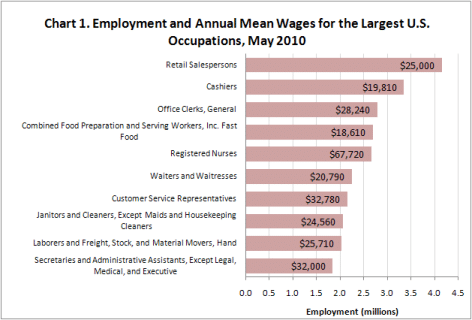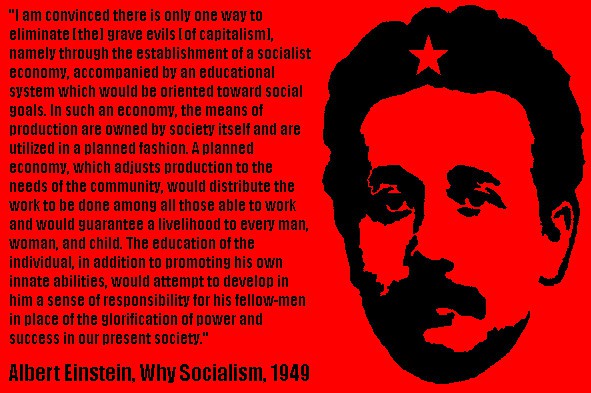 In 2010, about 139 million people, on average, were employed in the United States. What kind of work did they do? Here is an interesting table constructed by the Bureau of Labor Statistics:
In 2010, about 139 million people, on average, were employed in the United States. What kind of work did they do? Here is an interesting table constructed by the Bureau of Labor Statistics:
These occupations comprise one of every five jobs in the nation. Notice that the only one with a decent average wage is nursing. Given that low pay and less than desirable working conditions usually go together, it is safe to say that the rest of these jobs are in most respects bad ones. Even nursing is mind- and body-punishing employment, so much so that nurses have been leaving their profession in droves, the relatively high earnings notwithstanding.
Critics might say that yes, these are undesirable jobs, but things are going to change. They argue that we are going to need millions of highly trained and educated professionals, because of the rapid development of sophisticated information and other technologies. Now, if this were so, we should see occupation projections to match. The Bureau of Labor Statistics makes such projections. Here are those for 2008-2018 for the jobs predicted to generate the most additional employment:
Occupations # of new jobs Wages Educ./training
(5/08 median)
Registered nurses 581,500 $62,450 Assoc. degree
Home health aides 460,900 20,460 Sh.-term OJT
Customer service reps 399,500 29,860 Med-term OJT
Combined food prep-
serving workers, incl.
fast food 394,000 16,430 Sh.-term OJT
Personal/home care aides 375,800 19,180 Sh.-term OJT
Retail salespersons 374,700 20,510 Sh-term OJT
Office clerks, general 358,700 25,320 Sh.-term OJT
Accountants and auditors 279,400 59,430 BA
Nursing aides, orderlies,
and attendants 276,000 23,850 Post-sec. Voc.
Postsecondary teachers 256,900 58,830 PhD
Construction laborers 255,900 28,520 Med.-term OJT
Elementary school
teachers, exc.spec. ed. 244,200 49,330 BA
Truck drivers, heavy/
tractor-trailer 232,900 37,270 Sh.-term OJT
Landscaping and grounds-
keeping workers 217,100 23,150 Sh.-term OJT
Bookkeeping, accounting,
and auditing clerks 212,400 32,510 Med.-term OJT
Executive secretaries and
administrative assistants 204,400 40,030 Rel.work exp.
Management analysts 178,300 73,570 BA or higher
Computer software
engineers, applications 175,100 85,430 BA
Receptionists and
Information clerks 172,900 24,550 Sh.-term OJT
Carpenters 165,400 38,940 Long-term OJT
SOURCE: BLS Occupational Employment Statistics and Division of Occupational Outlook
The labor market of the near future looks much like that of the recent past, with a high proportion of new jobs paying low wages and requiring no special schooling or skill. Of the 5,816,000 projected new jobs, only a little more than 20 percent paid more than $50,000 in 2008, and nearly half of these are the aforementioned registered nurses. By contrast, some 56 percent paid less than $30,000, which some economists would consider a poverty income.
If we extend our view to the world, we find that the overwhelming majority of jobs pay a subsistence wage or less, with workers, including millions of children, laboring under unimaginably poor conditions and forced to do numbingly repetitive tasks for a dozen hours a day or more. There are no indications that this will change anytime soon.
We can represent the jobs structure by a triangle, with the mass of jobs at the base, poorly paid, requiring limited advanced education or training, and demanding little of the capacity for conceptualization and planning inherent in almost every human being. Jobs get better as we move toward the top of the triangle, but there are fewer of them.
There is a compelling reason why we have such a job structure: we live in a capitalist world. Capitalists exist to make money. They do this by hiring workers and then compelling them to labor for as long and intensively as possible, so that they produce revenue as much greater than their wages as feasible. To do this effectively and remain in business in the face of brutal competition, employers must try to exert maximum control over their workers’ labor, that is, convert as much of their hirelings’ capacity to labor into actual work as they can. Employers must control every aspect of how work is organized and performed. If they do not, their workers might be able to disrupt production enough to lower profits or even reduce them to zero or make them negative.
What kind of workers might be best able to impede the flow of profits? Isn’t it obvious that these would be those with knowledge the management doesn’t have—those with specialized skills, those who grasp the totality of the firm’s production processes, those who can conceptualize the work they perform and act upon their understanding? In a word, those employees who are missing in action in the data cited above. This means that unless the job structure radically changes, a future of good jobs is unlikely.
Education is often put forward as the most promising candidate for changing the job structure. More and better schooling could, it is said, put every working person in the world on the road to prosperity. Let us look at this proposition.
It is difficult to see how education could make, say, a hotel room attendant’s job a better one. If every attendant in the world got a college degree, what would make hotel managers pay more money or make conditions better for the same work as before they all got diplomas? Now it might be the case that at least some of the attendants could now get better jobs, but then the managers would fill vacancies with less educated people. Worldwide the pool of available laborers for relatively unskilled jobs is extraordinarily large, so hotels are not likely to ever face a shortage large enough that they would have to pay significantly higher wages and improve conditions. But even if they did, this would have nothing to do with education.
What if every worker in the world obtained more schooling? Imagine that there was not a single person anywhere who did not possess a first-rate college education, trained just like those who now attend elite colleges and universities and usually get the best employment. Would this change the job structure? Would it resemble an upside down triangle, with a few bad jobs at the bottom and hundreds of millions of great ones at the top? The only way this could happen would be, first, if there was full employment and one set of educated workers couldn’t undercut another; and second, if the now educated workers all banded together and refused to work at any job that didn’t pay a high wage and provide excellent conditions. Oh, but wait a minute, that could happen now. It’s called forming labor unions and building a labor movement. Again, this has nothing to do with education.
Jobs are what they are because our economic system is what it is. It is the system that will have to change, not the amount of schooling each of us obtains. And this system won’t change unless there is massive, radical, global class warfare waged by workers on all fronts (on the job, politically, culturally) and in all places. If this doesn’t happen, the employment prospects for most people worldwide will be bleak. Low wages, longer hours, harder labor, and perpetual insecurity: these are what await us.
[Note: for a lucid account of the myth that education is the key to ending inequality and poverty, see the fine new book by John Marsh— Class Dismissed: Why We Cannot Teach or Learn Our Way Out of Inequality, published recently by Monthly Review Press.]









the new york review of books had an article on this topic this year—maybe reviewed by andrew hacker. one book was from georgetown university—a bunch of overpaid ‘economists’ who talked about the future job market—-lots of things like dieticiaNS, hairdressers, presumably lawyers to defend the georgeotwn u staff from criminal prosecution, etc. stuff we all need.
i’m not sure i’d even endorse ‘class dismissed’—probably know it. (could allus join up with mrzine on the holier than thou schtick).
The WSJ posted an interactive graph with the BLS data, where you can visually see the job structure pyramid that you mention. Few good jobs on the top, most on the bottom, indeed.
http://blogs.wsj.com/econo?mics/2011/05/18/most-commo?n-jobs-among-lowest-paid/t?ab/interactive/#
Really enjoyed the post Michael and will check out the John Marsh MR book on education.
Something seems missing. What about all the people directly and indirectly tied to the US securitymiltarypolice state. Millions of ‘workers’ in the US work in, around or for the Mil-industrial complex in some capacity or another. I dont know the exact numbers, but they are not trivial either. Maybe your BLS should add a new category. Security forces? War Dept? DHS+related?
The Social Security Administration reported that the median wage income in 2010 among 150 million workers reporting W-2 forms was $26.363. 1/6 or 25 million had incomes $0 to $5,000, another 1/6 incomes $5,000 to $15,000, and another 1/6 incomes $15,000 to $26,363. I have an essay about this at my web page blog http://benL8.blogspot.com. 75% of workers report wage income less than $50,000 a year. And of course, wage income is only $6 trillion and total personal income was $11 trillion. I wonder if there is an average income for all workers? Total income is $11.468 trillion according to the Joint Committee on Taxation, so divide that by all workers — $76,000. And the S.F. Federal Reserve bank has a graph showing average worker contribution to GDP at $109,000 per year. I calculated that 7% of all total personal income is the small portion that 50% of all workers receive for the labor effort. You were and are a professor, you might clarify all my assertions, and report on them yourself. I don’t believe that Marxism is a solution, it may be, but not necessarily. Is it democratic? I think widespread knowledge and a functioning democracy would work superior to a central bureaucracy. Though, I may be wrong. China, for all its problems, has a fairer Gini coefficient, which means a more balanced distribution of income and wealth. I think most life experience could easily be improved if we spread the rewards of work more evenly, provided public work or jobs so economic security extended to all who wanted work. Fairer and more efficient use of collective resources would create greater living benefits for all. Generalizations sound, well, insipid or stupid. They must follow from an intelligent discussion or else generalizations are just mindless spoutings. An ethos that balances material security for all with opportunity and reward for talent will replace our current laissez faire attitude that assumes society is structured well today.
Ben, some interesting comments. On average wages, incomes, etc. a good source is The State of Working America, put out by the Economic Policy Institute. The average wage for all production and nonsupervisory workers in less than the $26 you cite, so the group covered has to be different.
On Marxism, I see it as the best way to examine capitalism. As to what should supplant capitalism, all I can say is that there will have to be control by the workers of what they do and strong social control over the economy as a whole. Here the works of Michael Lebowitz offer some good insights. China, by the way, has seen its gini rise by leaps and bounds over the past 30 years.